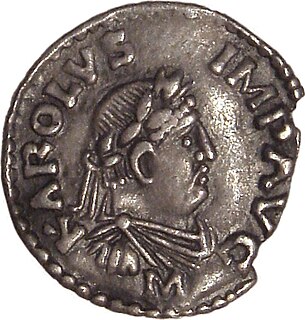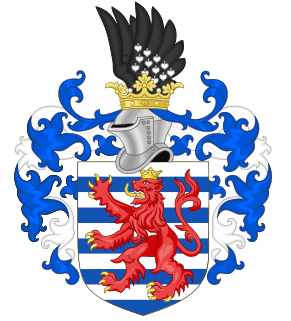Aftermath
Frederick I was murdered on his way home from the meeting on June 5 by Henry VII, Count of Waldeck.
The imperial election of 22 May 1400 was an imperial election held to select the emperor of the Holy Roman Empire. It took place in Frankfurt.
Wenceslaus IV of Bohemia, king of Bohemia, had been elected Holy Roman Emperor in the imperial election of 1376.
On 20 September 1378 the cardinals elected Antipope Clement VII pope in opposition to Pope Urban VI, whom they had come to distrust. The existence of two popes in opposition to one another, called the Western Schism, led to escalating international crises as the kings of Europe were forced to choose sides. On 29 November Wenceslaus's father Charles IV, Holy Roman Emperor died, and Wenceslaus acceded to the throne. Civil unrest in Bohemia prevented Wenceslaus from effectively administering the empire; he declined even to have a coronation ceremony as Holy Roman Emperor.
Because of Wenceslaus's weak rule and his failure to stamp out civil unrest or resolve the Western Schism, three of the prince-electors of the empire convened to remove him. They were:
The three electors at Frankfurt chose Frederick I, Duke of Brunswick-Lüneburg. However, the election did not have legal force as neither Johann II von Nassau, elector of Mainz, nor Werner of Falkenstein, elector of Trier, nor Frederick III of Saardwerden, elector of Cologne, nor Wenceslaus himself, who as king of Bohemia was an elector of the Holy Roman Empire, recognized it.
Frederick I was murdered on his way home from the meeting on June 5 by Henry VII, Count of Waldeck.

Louis IV, called the Bavarian, of the house of Wittelsbach, was King of the Romans from 1314, King of Italy from 1327, and Holy Roman Emperor from 1328.

Wenceslaus IV, also known as Wenceslaus of Luxembourg, was King of Bohemia from 1378 until his death and King of Germany from 1376 until he was deposed in 1400. As he belonged to the House of Luxembourg, he was also Duke of Luxembourg from 1383 to 1388.

Rupert of the Palatinate, sometimes known as Robert of the Palatinate, a member of the House of Wittelsbach, was Elector Palatine from 1398 and King of Germany from 1400 until his death.

Charles IV, also known as Charles of Luxembourg, born Wenceslaus, was the first King of Bohemia to become Holy Roman Emperor. He was a member of the House of Luxembourg from his father's side and the Czech House of Přemyslid from his mother's side; he emphasized the latter due to his lifelong affinity for the Czech side of his inheritance, and also because his direct ancestors in the Přemyslid line included two saints.

The Holy Roman Emperor, originally and officially the Emperor of the Romans during the middle ages, and also known as the German-Roman Emperor since the early modern period, was the ruler and head of state of the Holy Roman Empire. The empire was considered by the Roman Catholic Church to be the only successor of the Roman Empire during the Middle Ages and the early modern period. The title was held in conjunction with the title of king of Italy from the 8th to the 16th century, and, almost without interruption, with the title of king of Germany throughout the 12th to 18th centuries.

Adolf was the count of Nassau from about 1276 and the elected king of Germany from 1292 until his deposition by the prince-electors in 1298. He was never crowned by the pope, which would have secured him the imperial title. He was the first physically and mentally healthy ruler of the Holy Roman Empire ever to be deposed without a papal excommunication. Adolf died shortly afterwards in the Battle of Göllheim fighting against his successor Albert of Habsburg.

Conrad, a member of the Hohenstaufen dynasty, was the only son of Emperor Frederick II from his second marriage with Queen Isabella II of Jerusalem. He inherited the title of King of Jerusalem upon the death of his mother in childbed. Appointed Duke of Swabia in 1235, his father had him elected King of Germany and crowned King of Italy in 1237. After the emperor was deposed and died in 1250, he ruled as King of Sicily until his death.

The House of Luxembourg or Luxembourg dynasty was a royal family of the Holy Roman Empire in the Late Middle Ages, whose members between 1308 and 1437 ruled as kings of Germany and Holy Roman emperors as well as kings of Bohemia, Hungary and Croatia. Their rule was twice interrupted by the rival House of Wittelsbach.
There were many imperial interregna in the history of the Holy Roman Empire, when there was no emperor. Interregna in which there was no emperor-elect were rarer. Among the longest periods without an emperor were between 924 and 962, between 1245 and 1312, and between 1378 and 1433. The crisis of the government of the Holy Roman Empire and the German kingdom thus lasted throughout the late medieval period, and ended only with the rise of the House of Habsburg on the eve of the German Reformation and the Renaissance. The term Great Interregnum is occasionally used for the period between 1250 and 1273.
The imperial election of 1376 was an imperial election held to select the emperor of the Holy Roman Empire. It took place in Frankfurt on 10 June.
The imperial election of August 21, 1400 was an imperial election held to select the emperor of the Holy Roman Empire. It took place in Rhens.
The imperial election of October 1, 1410 was an imperial election held to select the emperor of the Holy Roman Empire.
The imperial election of 1411 was an imperial election held to select the emperor of the Holy Roman Empire. It took place on July 21.
The imperial election of 1440 was an imperial election held to select the emperor of the Holy Roman Empire. It took place in Frankfurt on February 2.
The imperial election of 1486 was an imperial election held to select the emperor of the Holy Roman Empire. It took place in Frankfurt on February 16.
The imperial election of 1636 was an imperial election held to select the emperor of the Holy Roman Empire. It took place in Regensburg on December 22.
The imperial election of 1790 was an imperial election held to select the emperor of the Holy Roman Empire. It took place in Frankfurt on September 30.

The imperial election of 1273 was an imperial election held to select the emperor of the Holy Roman Empire. It took place in Frankfurt on October 1.

The imperial election of October 19, 1314 was an imperial election held to select the emperor of the Holy Roman Empire. It took place in Sachsenhausen, near Frankfurt.

The imperial election of October 20, 1314 was an imperial election held to select the emperor of the Holy Roman Empire. It took place in Frankfurt.